Installation of ball mills and other major equipment for Kakula’s first 3.8-million-tonne-per-annum processing plant well underway
Second mining crew added at the Kansoko Mine, increasing the pace of underground development at Kamoa-Kakula’s second mine
Pre-production surface stockpiles at Kakula North, Kakula South and Kansoko now contain an estimated 671,000 tonnes of ore
Ivanhoe Mines to issue independent definitive feasibility study and expansion studies for the entire Kamoa-Kakula Copper Project on September 8, 2020; host Investor Day on September 10, 2020
KOLWEZI, DEMOCRATIC REPUBLIC OF CONGO – Ivanhoe Mines (TSX: IVN; OTCQX: IVPAF) Co-Chairs Robert Friedland and Yufeng “Miles” Sun announced today that underground development at the Kakula Copper Mine totalled 1,842 metres in August, bringing the cumulative total underground development completed to date to more than 20.6 kilometres – approximately 6.0 kilometres ahead of schedule.
The majority of the underground development headings at the Kakula Mine currently are traversing medium-grade sections of the orebody, with average grades ranging between 3% and 5% copper. A concentrated effort was made in August to complete the ledging development in the room-and-pillar section of the mine to accommodate critical infrastructure, such as piping and electrical cabling, for the mine’s permanent water-handling system.
The ledging development work will be completed early this month and will allow the mining teams to begin highly-productive stoping operations; however, the development work was in lower-grade ore and resulted in a temporary, modest decrease in overall stockpile grade in August and early September.
The stockpile grade is expected to improve, as planned, beginning this month as the majority of the working areas will transition to the higher-grade ore zones near the centre of the deposit that have copper grades approximately +5% to +8%.
The beneficial handover of the high-capacity ore conveyor system at the Kakula North declines was achieved at the end of July. All of the ore being mined in the northern portion of the Kakula Mine now is transported to surface via the conveyor system and placed on a blended, run-of-mine surface stockpile. The blended stockpile contains 483,000 tonnes grading an estimated 3.76% copper; comprised of 116,000 tonnes of high-grade ore grading 6.08% copper and 367,000 tonnes of medium-grade ore grading 3.02% copper.
Two additional, pre-production ore stockpiles are located at the Kakula South decline (approximately 121,000 tonnes grading 2.36% copper) and the Kansoko decline (approximately 68,000 tonnes grading 2.21% copper). More than 109,000 tonnes of ore was added to the project’s pre-production stockpiles in August.
Surface conveyor systems to transport the ore from the Kakula North stockpile to the processing plant are under construction.
First copper production expected in less than a year
Initial production at the Kakula Mine is scheduled for Q3 2021. Kakula is projected to be the world’s highest-grade major copper mine, with an initial mining rate of 3.8 million tonnes per annum (Mtpa) at an estimated average feed grade well in excess of 6% copper over the first five years of operation.
The Kakula Mine will have one of the most favourable environmental footprints of any tier-one copper mine anywhere in the world. The mine will be powered by clean, renewable hydroelectricity and be among the world’s lowest greenhouse gas emitters per unit of copper produced. Kakula also will have a relatively small surface footprint as approximately 55% of the mine’s tailings will be pumped back into underground workings.
The Kamoa-Kakula Copper Project is a joint venture between Ivanhoe Mines (39.6%), Zijin Mining Group (39.6%), Crystal River Global Limited (0.8%) and the DRC government (20%).
“Together with our joint-venture partners, we look forward to sharing the independently verified engineering and economic studies on September 8th that will showcase why Kamoa-Kakula is, without question, the world’s best new copper project,” said Mr. Friedland. “Kamoa-Kakula is unique as it combines ultra-high-copper grades with thick, shallow, flat-lying ore zones, providing the economies of scale and low mining costs of large, open-pit mining operations, but without the visual environmental impact associated with open-pit mining.”
“We also plan to soon announce the appointment of a leading environmental consulting firm to audit Kamoa-Kakula’s greenhouse gas intensity metrics, providing Environmental, Social and Governance investors with independent and transparent verification of the project’s achievements towards our goal of producing the world’s greenest copper,” Mr. Friedland added.
Aerial view of the Kakula Mine showing the tonnes and grade of the main pre-production stockpiles at the northern declines. The stockpile currently contains approximately 483,000 tonnes grading 3.76% copper; comprised of approximately 116,000 tonnes at 6.08% copper and 367,000 at 3.02% copper.
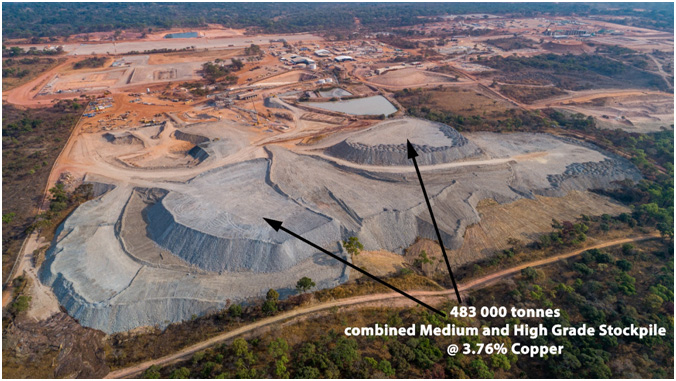
Kakula southern decline medium-grade ore stockpile currently containing approximately 121,000 tonnes grading 2.36% copper.
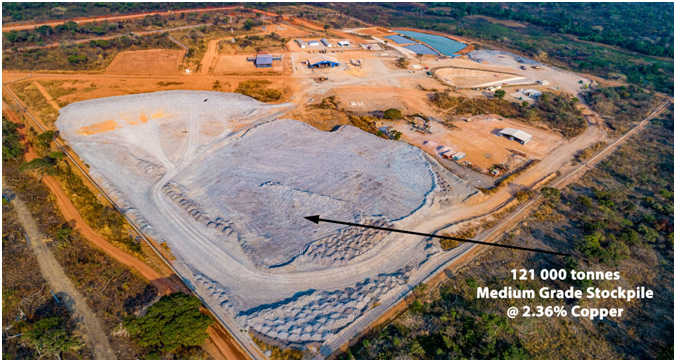
Kansoko decline medium-grade ore stockpile currently containing approximately 68,000 tonnes grading 2.21% copper.
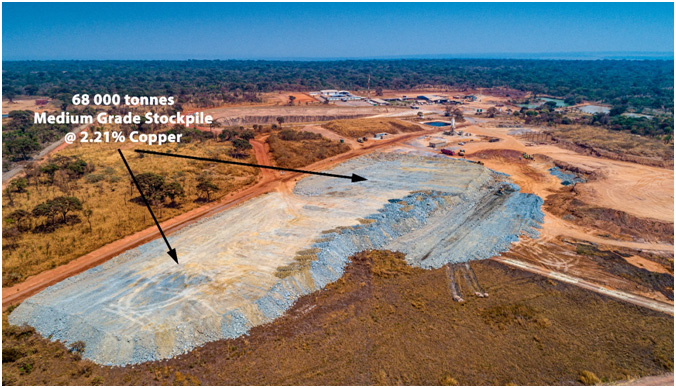
Kakula Mine development progressing towards zone of +8% copper in centre of deposit
Underground development of the Kakula Mine – the first of multiple, near-surface copper deposits that are planned to be put into production on the 400-square-kilometre Kamoa-Kakula mining licence – is now significantly ahead of schedule. Mine access drives 1 and 2 (interconnected, parallel tunnels that will provide access to ore zones) being driven from the Kakula northern declines continue to advance towards the southern portion of the orebody.
Development of the eastern perimeter drives also is well advanced as are the access drives to the room-and-pillar mining area. Development of twin access drives being driven from Kakula’s southern portal has reached the +5% copper mining zone, with mining crews working to establish the connection of these drives with mine access drives 1 and 2 from the northern side of the orebody. The northern and southern access drives are expected to join in November 2020, which will be a major milestone in the development of the Kakula orebody.
Once the northern and southern access drives are connected, the majority of mining activities will focus on the initial drift-and-fill mining blocks in the centre of the Kakula deposit, where the average grade is higher than 8% copper. Drift-and-fill stoping is a highly-efficient form of underground mechanized mining and will allow the operation to efficiently recover significantly more tonnes from the orebody.
Underground mining with two mining crews also is taking place at the Kansoko Mine, located at the Kamoa deposit, approximately 10 kilometres north of the Kakula Mine.
The construction of Kakula’s second permanent underground water-handling system is nearing completion with the first of four pump trains commissioned in early August; the second pump train was commissioned in the last week of August. The new system adds 800 litres per second of underground pumping capacity, bringing the total installed capacity to 1,400 litres per second. Two additional underground water dams are under construction; one at bottom of the southern declines, and one along the north eastern perimeter drifts.
Ivanhoe plans to issue the independent definitive feasibility study for the development of the 6 Mtpa Kakula Mine on September 8, 2020. The company also will issue a pre-feasibility study, including mining 1.6 Mtpa from the Kansoko Mine, to take full advantage of an expanded plant capacity of 7.6 Mtpa at Kakula. In addition, the company will issue an updated, expanded preliminary economic assessment for the overall development plan of up to 19 Mtpa for all of the copper discoveries made to date at the Kamoa-Kakula Project.
Martin Nkulu, conveyor belt attendant, monitoring high-grade copper ore being delivered to surface via the Kakula North decline conveyor, which has the capacity to transport 2,000 tonnes of ore an hour.
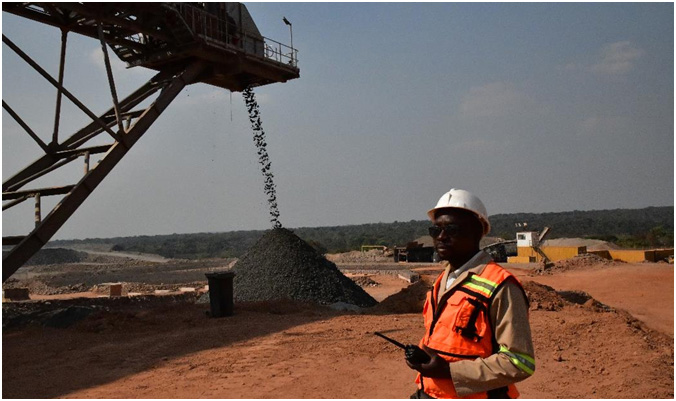
A load of copper ore being transported up the Kakula South decline. One of the two southern access drives has entered the +5%-copper mining zone, while the other will enter it shortly. The southern access drives are expected to join the northern access drives in November.
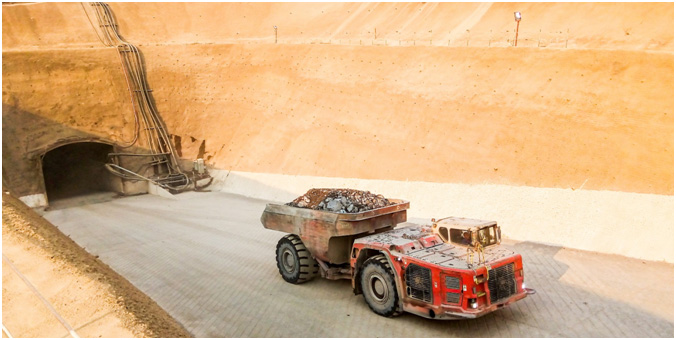
Kasongo Mahji at a surface settling pond for Kakula’s second permanent underground dewatering pipe system that was commissioned in early August.
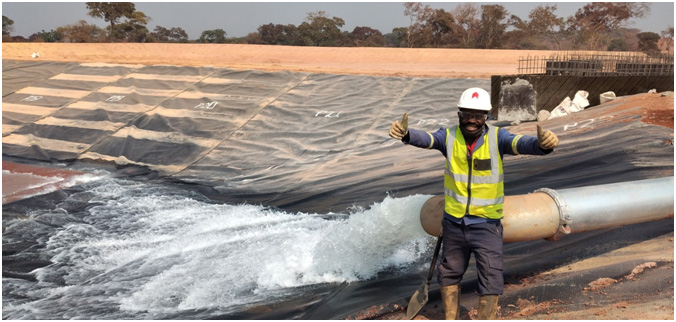
Figure 1: The eastern portion of Kakula Mine ─ representing less than half of the overall 13.3-kilometre-long Kakula Deposit ─ overlain on southern Manhattan Island to give a sense of the scale of the underground operations.
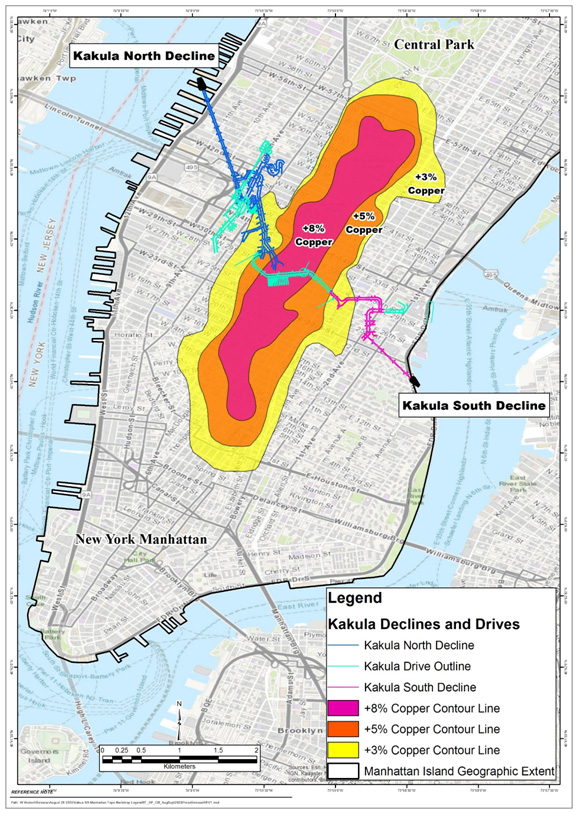
Figure 2: Underground development completed to the end of July (in black) and scheduled development (green, brown, blue & black) until September 30, 2020. Shown are the 3%, 5% and 8% copper contours and the location where the northern and southern access drives are scheduled to join in November 2020 (red circle).
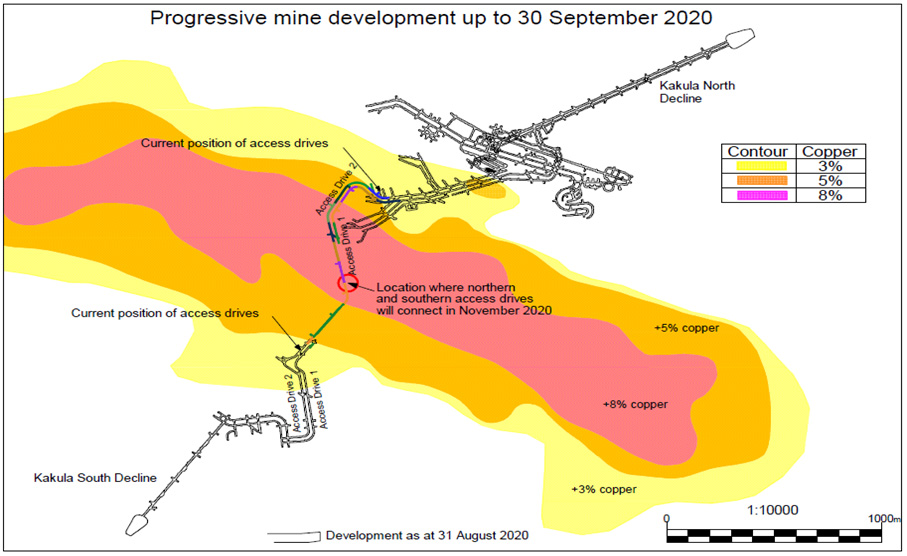
Figure 3: Underground development completed to the end of July (in black) and scheduled mine development over the three months ending December 31, 2020. Majority of the development during this period will be in the initial drift-and-fill mining area within Kakula’s high-grade zone (+8% copper).
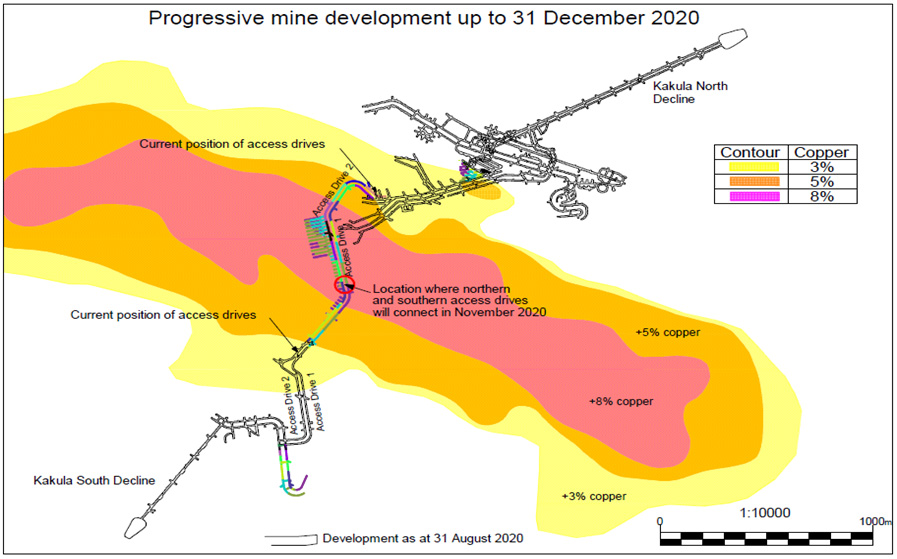
Construction on the processing plant and other surface infrastructure rapidly progressing
Construction of Kakula’s initial, 3.8-Mtpa concentrator plant is progressing well, with approximately 20,000 cubic metres of concrete being poured to date. Concrete bases for the ball mills, flotation plant and the concentrate thickener have been partially handed over to the mechanical contractor to commence installation work, and mechanical erection and installation is underway in most of the plant areas. Structural steel fabrication is complete with more than half of the approximately 6,000 tonnes of structural steel already delivered to site. Fabrication of platework and piping is progressing according to schedule with the first deliveries already on site; platework installation has started.
Total steel prefabricated or installed is approximately 2,000 tonnes. All floor and sidewall plates for the concentrate thickener now are in position, and welding is 40% complete.
Installation of the tailings thickener has commenced, with the centre column being placed in position and welding of the floor plates underway. Pre-assembly of the high-pressure grinding rolls feed bin #1 conveyor has started. Both secondary crushers have been assembled and placed in position. Installation of the first ball mill shell has been completed.
All 21 oversized truck loads of equipment for the processing plant’s primary ball mill − measuring 9.75 metres (32 feet) long and 6.1 metres (20 feet) in diameter – have arrived on site. The final shipments of the ball mill components are scheduled to arrive at site this month, which will be the final deliveries of long-lead plant equipment.
Beijing-based CITIC Construction is building Kakula’s first-phase, backfill paste plant. The backfill plant will be used to blend tailings from the processing plant with cement to produce paste backfill. The backfill will be pumped back into the mine and used to help support mined-out areas. Approximately 55% of the mine’s tailings will be sent back underground, significantly reducing the surface tailings storage.
Construction of the tailings dam has commenced and is progressing well; with the aim to complete most of the earthworks before the rainy season starts in November.
Led by the 400-tonne crane, a convoy of trucks carrying steel and equipment en route to the Kamoa-Kakula Project. The last truckloads of long-lead items for the processing plant are expected to arrive at site before the end of September.
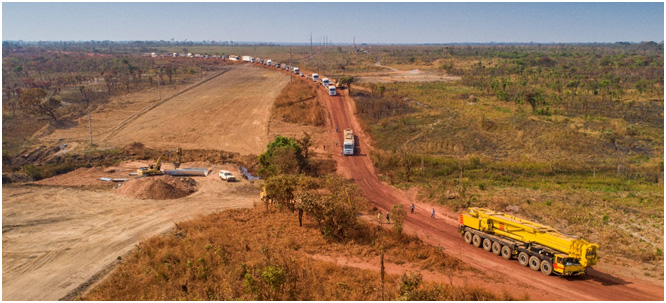
Ongoing construction of Kakula’s 3.8-Mtpa processing plant. Members of Kamoa-Kakula’s construction team in front of one of the ball mill shells prior to it being lifted into place by a 400-tonne crane (second picture below).
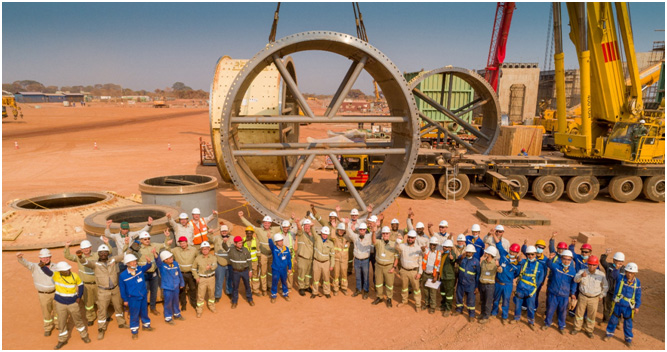
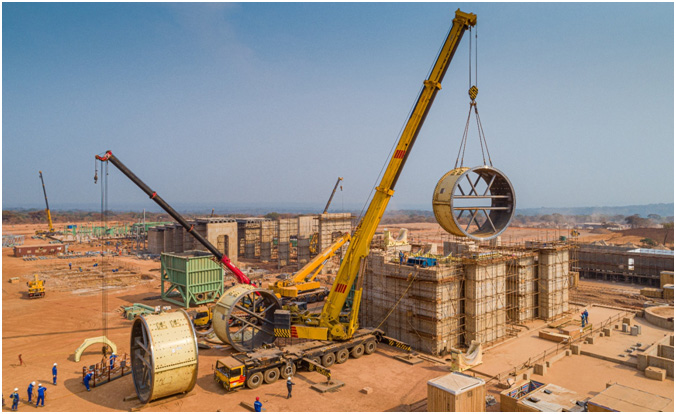
To view a short, time-lapse video of the installation of the first of three ball mill shells, click here: https://vimeo.com/451270670
The 400-tonne crane lifts a platform section for the flotation cells into positon.
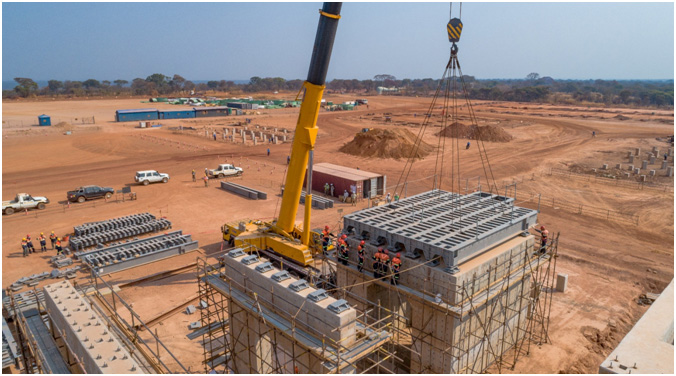
Installation of the discharge end and trunnion for the primary ball mill.
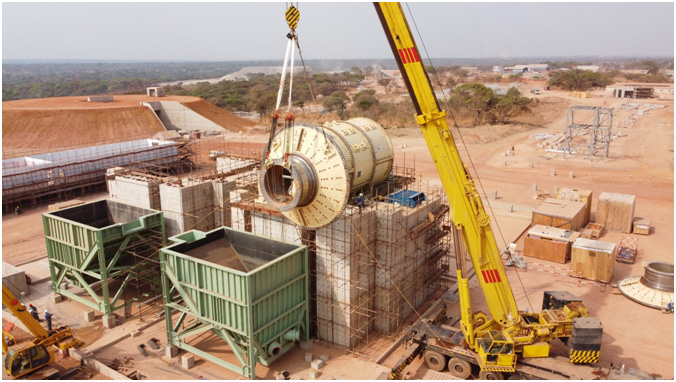
Installation of the secondary crushers at the processing plant.
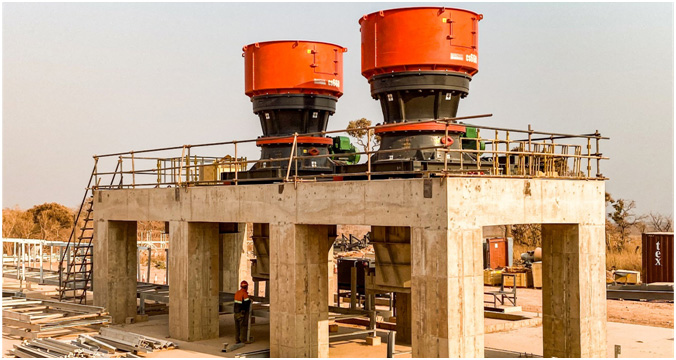
Contract employees assembling the processing plant’s concentrate thickener.
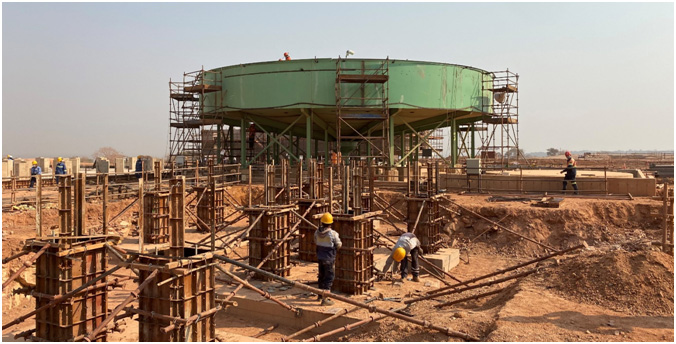
Discussions underway for the marketing of Kakula’s copper concentrates
Kamoa-Kakula is in detailed discussions with a number of parties with respect to the marketing and smelting of its copper concentrates. Kakula is expected to produce an extremely high-grade and clean copper concentrate that will be highly coveted by copper smelters around the world. Metallurgical test work indicates that the Kakula concentrates contain extremely low arsenic levels by world standards – approximately 0.01%.
Clean, sustainable hydro-electric power for Kamoa-Kakula
Construction activities at the Mwadingusha hydro-electric power plant, where all six turbines are being replaced, is progressing well; as is the associated 220-kilovolt (kV) infrastructure to supply Kamoa-Kakula with clean hydro-power. The mine is scheduled to be energized with permanent 220kV hydro-generated power in early 2021, well in time for first copper production.
The temporary construction power supply for the Kakula Mine was recently upgraded, including the commissioning of six 2-megawatt (MW) generators to provide back-up power, and the installation of an 18 MW/120-kilovolt (kV) mobile substation to increase the capacity of grid power available at the mine. This will provide sufficient power until the main 220kV power supply is energized. An additional six new 2MW generators have arrived at the port of Durban from China, and are en route to site. The twelve generators will supply the full back-up power requirements for the mine.
Construction of the 220kV supply infrastructure is in progress, including a new 220kV distribution sub-station for the power utility (SNEL); a new 35-kilometre, 220kV power line; and a consumer substation at Kakula with two 80 MW/220kV transformers.
Installing a new alternator in the Mwadingusha hydro-electric power plant. Mwadingusha will soon be delivering 72 MW of clean, sustainable hydroelectricity to the national grid.
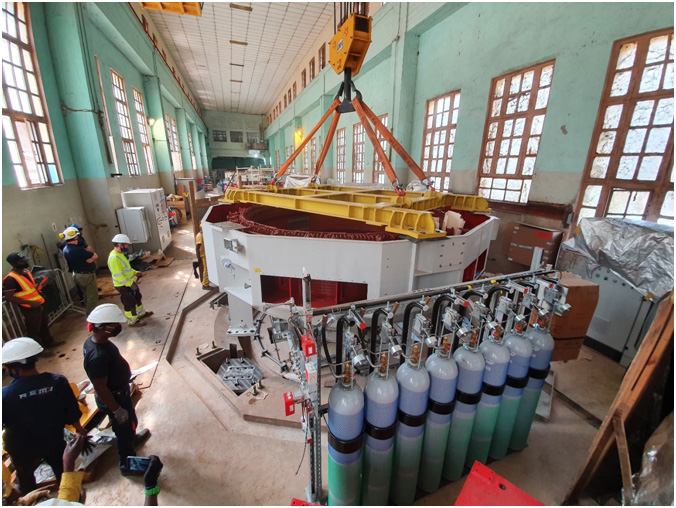
Kamoa-Kakula’s COVID-19 readiness initiatives focused on risk mitigation
In accordance with new health guidelines from the DRC government, and in line with the country’s lifting of restrictions, Kamoa-Kakula lowered its quarantine and lockdown measures from level 3 to level 2 on July 27th. The mine’s Congolese workforce have gone back to normal rotation. Rigorous testing, physical distancing, wearing face masks, frequent hand washing and contact tracing measures are still in place to protect the safety and health of the workforce and community members. All expatriate employees are still required to quarantine for two weeks upon arrival at Kamoa-Kakula.
The project has established a COVID-19 isolation facility at the Kamoa camp. Any potential symptomatic patients are moved to this facility, where they will be isolated, tested and treated. Once the patient has recovered and is deemed no longer infectious, they can return to work only after an additional quarantine period determined by the project’s medical staff in dedicated quarantine.
As the pandemic evolves, the medical team at Kamoa-Kakula is purposefully reviewing and updating its risk mitigation protocols. The project’s preventative measures are at the highest international standards and, if there was a case internally, the risk of spreading or cross-contamination is very low.
Members of a community women’s group that owns and operates a banana plantation near the Kamoa-Kakula Project. The plantation is one of Kamoa-Kakula’s initiatives to enhance food security in nearby communities.
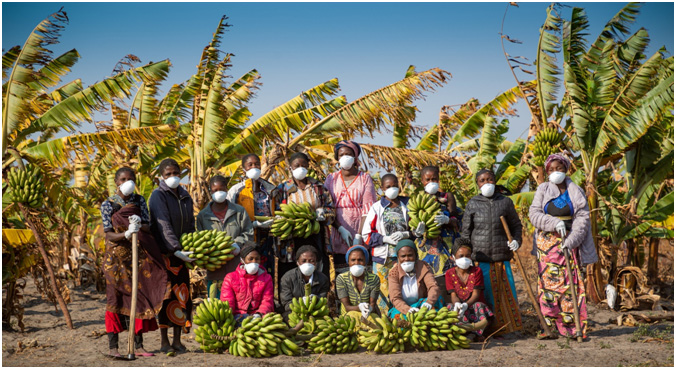
Qualified Persons
Disclosures of a scientific or technical nature regarding development scenarios at the Kamoa-Kakula Project in this news release have been reviewed and approved by Steve Amos, who is considered, by virtue of his education, experience and professional association, a Qualified Person under the terms of NI 43-101. Mr. Amos is not considered independent under NI 43-101 as he is the Head of the Kamoa Project. Mr. Amos has verified the technical data disclosed in this news release.
Other disclosures of a scientific or technical nature in this news release have been reviewed and approved by Stephen Torr, who is considered, by virtue of his education, experience and professional association, a Qualified Person under the terms of NI 43-101. Mr. Torr is not considered independent under NI 43-101 as he is the Vice President, Project Geology and Evaluation. Mr. Torr has verified the other technical data disclosed in this news release.
The stockpile grade estimates contained in this release are based upon bulk ore sampling from underground headings. Sampling is done on each heading every second blast and three 5-kilogram samples are taken. The samples are pulverized at the project’s onsite laboratory and analyzed used using a portable XRF (pXRF) instrument. Kamoa Copper has routinely analyzed its exploration drill core for copper using pXRF, in addition to analysis at a commercial laboratory using four acid digest and ICP-OES. This data has demonstrated that pXRF results can be relied upon for grade control and run-of-mine sampling.
Ivanhoe has prepared a current, independent, NI 43-101-compliant technical report for the Kamoa-Kakula Project, which is available on the company’s website and under the company’s SEDAR profile at www.sedar.com:
- The Kamoa-Kakula 2020 Resource Update dated March 25, 2020, prepared by OreWin Pty Ltd., Wood plc, DRA Global, SRK Consulting (South Africa) (Pty) Ltd and Stantec Consulting International LLC.
The technical report includes relevant information regarding the assumptions, parameters and methods of the mineral resource estimates on the Kamoa-Kakula Project cited in this news release, as well as information regarding data verification, exploration procedures and other matters relevant to the scientific and technical disclosure contained in this news release.
Information contacts
Investors: Bill Trenaman +1.604.331.9834 / Media: Matthew Keevil +1.604. 558.1034
Forward-looking statements
Certain statements in this release constitute “forward-looking statements” or “forward-looking information” within the meaning of applicable securities laws. Such statements and information involve known and unknown risks, uncertainties and other factors that may cause the actual results, performance or achievements of the company, its projects, or industry results, to be materially different from any future results, performance or achievements expressed or implied by such forward-looking statements or information. Such statements can be identified by the use of words such as “may”, “would”, “could”, “will”, “intend”, “expect”, “believe”, “plan”, “anticipate”, “estimate”, “scheduled”, “forecast”, “predict” and other similar terminology, or state that certain actions, events or results “may”, “could”, “would”, “might” or “will” be taken, occur or be achieved. These statements reflect the company’s current expectations regarding future events, performance and results and speak only as of the date of this release.
Such statements include without limitation, the timing and results of: (i) statements regarding the Definitive Feasibility Study for the Kakula Mine, and an updated Integrated Development Plan for multiple expansions of the entire Kamoa-Kakula mining licence, planned to be issued on September 8, 2020; (ii) statements regarding as Kakula’s underground development progresses over the next few months, the majority of the working areas are expected to transition into the higher-grade ore zones near the centre of the deposit that have copper grades approximately 5% to 8%; (iii) statements regarding initial production at the Kakula Mine is scheduled for Q3 2021; (iv) statements regarding Kakula is projected to be the world’s highest-grade major copper mine with an initial mining rate of 3.8 million tonnes per annum (Mtpa) at an estimated average feed grade in excess of 6% copper over the first five years of operation; (v) statements regarding the Kakula Mine will have one of the most favourable environmental footprints of any tier-one copper mine; (vi) statements regarding the Kakula Mine will be powered by clean, renewable hydroelectricity and be among the world’s lowest greenhouse gas emitters per unit of copper produced; (vii) statements regarding Kakula will have a relatively tiny surface footprint as approximately 55% of the mine’s tailings will be pumped back into underground workings; (viii) statements regarding the last truckloads of long-lead items for the processing plant are expected to arrive at site before the end of September; (ix) statements regarding as underground development progresses at the Kakula and Kansoko mines over the next few months, the grade of the project’s three medium-grade stockpiles is forecast to increase to between 3% – 5% copper; (x) statements regarding the northern and southern access drives at Kakula are expected to be joined in November 2020; (xi) statements regarding in roughly one year, the Kakula Mine will be producing extremely high-grade concentrate containing over 55% copper with essentially zero arsenic; (xii) statements regarding Kamoa-Kakula is unique as it combines ultra-high-copper grades with thick, shallow, flat-lying ore zones, providing the economies of scale and low mining costs of large, open-pit mining operations, but without the environmental scarring often associated with open-pit mining; and (xiii) statements regarding the Kakula mine is scheduled to be energized with permanent 220kV hydro-generated power in early 2021.
As well, all of the results of the pre-feasibility study for the Kakula copper mine and the updated and expanded Kamoa-Kakula Project preliminary economic assessment constitute forward-looking statements or information, and include future estimates of internal rates of return, net present value, future production, estimates of cash cost, proposed mining plans and methods, mine life estimates, cash flow forecasts, metal recoveries, estimates of capital and operating costs and the size and timing of phased development of the projects. Furthermore, with respect to this specific forward-looking information concerning the development of the Kamoa-Kakula Project, the company has based its assumptions and analysis on certain factors that are inherently uncertain. Uncertainties include: (i) the adequacy of infrastructure; (ii) geological characteristics; (iii) metallurgical characteristics of the mineralization; (iv) the ability to develop adequate processing capacity; (v) the price of copper; (vi) the availability of equipment and facilities necessary to complete development; (vii) the cost of consumables and mining and processing equipment; (viii) unforeseen technological and engineering problems; (ix) accidents or acts of sabotage or terrorism; (x) currency fluctuations; (xi) changes in regulations; (xii) the compliance by joint venture partners with terms of agreements; (xiii) the availability and productivity of skilled labour; (xiv) the regulation of the mining industry by various governmental agencies; (xv) the ability to raise sufficient capital to develop such projects; (xiv) changes in project scope or design, and (xv) political factors.
Forward-looking statements and information involve significant risks and uncertainties, should not be read as guarantees of future performance or results and will not necessarily be accurate indicators of whether or not such results will be achieved. A number of factors could cause actual results to differ materially from the results discussed in the forward-looking statements or information, including, but not limited to, the factors discussed below and under “Risk Factors”, and elsewhere in this release, as well as unexpected changes in laws, rules or regulations, or their enforcement by applicable authorities; the failure of parties to contracts with the company to perform as agreed; social or labour unrest; changes in commodity prices; and the failure of exploration programs or studies to deliver anticipated results or results that would justify and support continued exploration, studies, development or operations.
Although the forward-looking statements contained in this release are based upon what management of the company believes are reasonable assumptions, the company cannot assure investors that actual results will be consistent with these forward-looking statements. These forward-looking statements are made as of the date of this release and are expressly qualified in their entirety by this cautionary statement. Subject to applicable securities laws, the company does not assume any obligation to update or revise the forward-looking statements contained herein to reflect events or circumstances occurring after the date of this release.
The company’s actual results could differ materially from those anticipated in these forward-looking statements as a result of the factors set forth below in the “Risk Factors” section in the company’s Q1 2020 MD&A and its current annual information form.


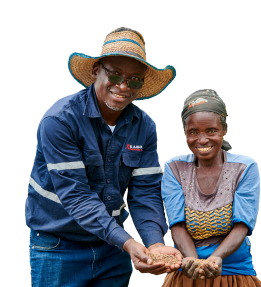
 English
English Français
Français 日本語
日本語 中文
中文